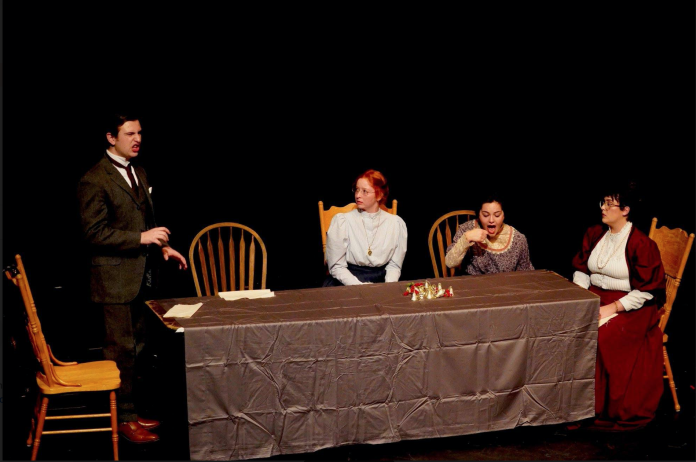
The Long Christmas Dinner by Thornton Wilder is a very powerful, existential play that premiered on campus during this weekend’s Muhlenberg Theatre Association [MTA] Studio Production festival. On Friday, Saturday and Sunday evenings, four student-produced one-act plays debuted in the Studio Theatre for an audience of roughly one hundred people each. Featuring two hilarious comedies, The Actor’s Nightmare by Christopher Durang and A Marriage Proposal by Anton Chekhov, as well as two heartbreaking tragedies, La Maestra by Enrique Buenaventura and The Long Christmas Dinner by Thornton Wilder, the event brought with it a lot of eager theatergoers and a weekend of astoundingly successful attention for the MTA.
The Long Christmas Dinner was directed by senior Maris Quagliata ‘20, who explained that her fascination with Wilder’s work on this piece began right here on campus. “I chose this play after Charlie [Richter, professor of Theatre and Dance] had talked about it to my directing class a lot, mentioning how much he loved the play and wanted to see it be done at the college,” says Quagliata. “I took the opportunity to read it and really fell in love with the story that was being told.”
The Long Christmas Dinner featured a large cast performing from a dramatic text written in 1931; a modern lens became essential in Quagliata’s direction in order to accurately portray the events of the story: Many generations of the same family are seated around a dining room table every year for Christmas, and they soon watch as monotony overtakes the magic of the holiday, and with each passing year the brutal message of mortality reveals the dark truth that each person at this table only has a limited time to make something of their lives before they disappear into memory for future generations at Christmas.
The power behind this story was in modeling the consequence of complacency, and the production team did a wonderful job of making this universal concept of a Christmas dinner something that audience members could latch onto. In other words, the Christmas dinner was transformed into a concept imbued with a familiar sense of nostalgia that ideally brought light into the more serious themes being expressed through the piece.
“I think the reason this show needs to be seen by a modern audience is because it brings us back to our roots and makes us think about the world around us more realistically,” Quagliata explains. “Today’s society is so focused on the next thing, we forget to enjoy what we have right now in the moment because you’ll never know when you won’t have those things anymore. The story is all about the passing of time and family traditions and their values.”
The set was complete with a large, family-sized table and an artistic backdrop of a starry night sky projected onto the back curtain of the studio theatre. The stars added an ethereal element to the work being shown onstage that brought light to mortality and the truth about humanity’s curse of finite time that truly defined the importance of this play.
In addition, the staging of this production really depended on the strong performance of the actors, who definitely showed that they had quite a strong grasp on the material.
Quagliata explains that she encouraged the directing process to be just as much about how the actors interpreted the story as how she interpreted it, creating a more cohesive back-and-forth environment that allowed for the sharing of ideas.
“I’ve always found myself very interested in making this a collaborative process,” she says. “I wanted to know what the actors were thinking and what they were getting from the story as well [as] them knowing my thoughts. Working with the smart group of actors I got made the process so easy and fun; we really took the time to make sure that we were on the same page about what was happening in the moment, and it made all the difference.”
Cast member Sydney Holliday ‘23, who played the role of The Nurse, describes her experience as “the best first Muhlenberg theatre experience I could have asked for!” This seemed to be a testament to the humility, work ethic and genuine love for the arts projected by members of the cast of The Long Christmas Dinner.
“It’s also amazing to see how even just one audience member can be changed so drastically by a short, one-act play,” continues Holliday. Overall, the actors as well as the production team seemed to have an extremely supportive and thoughtful outlook in the presentation of their work.
Quagliata’s attention to detail in this piece seemed to be at the forefront of what this production stood for, and it showed in virtually every aspect of the final product. In her words, “I spent a lot of time with my stage manager and designers trying to figure out the best way to show the aging, both physical aging of people and the aging on the space. Eventually, everyone settled on ‘less is more.’ Wilder already calls for simplicity because the importance is the piece and the words and the people, not on the objects. At the end of the day we will remember the objects that are truly important to us, like the can that is used through the piece, or the little notebook Genevieve has recalling her family’s history. Having a simple set design helped with bringing this to life, as well as using only glasses and physicality to show the aging of the family.”
All in all, The Long Christmas Dinner was a moving piece of live theatre that highlighted the talent and dedication of Muhlenberg’s MTA and all of the students involved in creating a truly touching, heartfelt production that resonated even through the test of time.





















